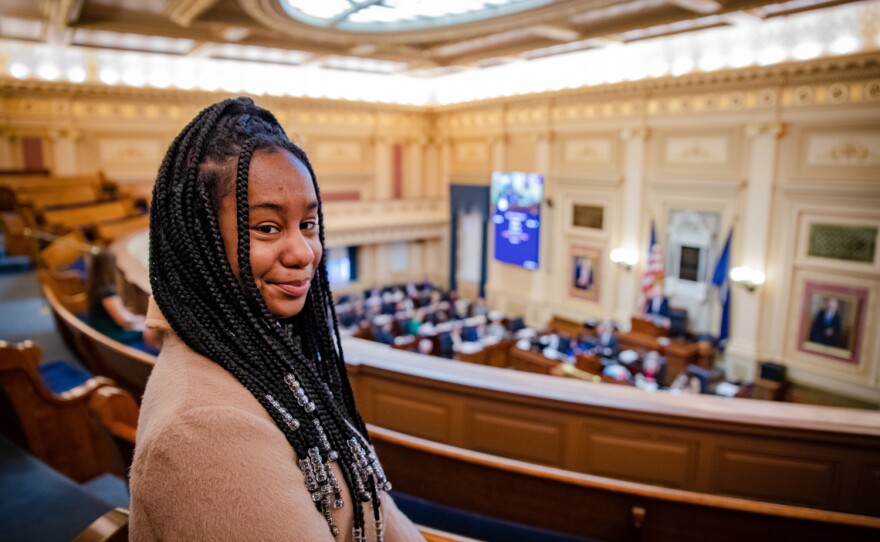Between virtual learning and racial justice protests, it’s been a long two years for youth in Virginia. Advocates say the recent turmoil highlighted the state’s lack of investment in mental health services for students. Hot-button political debates surrounding critical race theory and masking have overshadowed what some youth advocates say is a more pressing concern: their mental health.
“This issue is just going to get worse if we don't do something now,” says Allison Gilbreath, policy and programs director at the advocacy group Voices for Virginia’s Children.
For the past several years, Voices has turned to a group rarely seen in the halls of the legislature: teenagers themselves. They include 16 year-old Aaliyana Carr, who had a 4.0 GPA going into this year at Trinity Episcopal School in Richmond. She worked part-time at Chick-fil-A and danced for fun: ballet, jazz, hip-hop and pointe, a toe-heavy workout that’s “extremely painful” but also “really beautiful.”
Around September, burnout and depression took hold. Carr felt ostracized as a Black student at a mostly white school and says she didn’t get help from staff. Some days, she would walk into class crying; teachers, she said, ignored it.
“It was really hard for me to pay attention to school and find the motivation to get out of bed some days,” Carr says.
In December, Carr began therapy. She threw herself into the exercises the therapist gave her, “because I was tired of living a miserable life every single day.” Gradually, she says she’s felt more like herself.
Carr’s experience is becoming more common. One in three high school students reported persistent feelings of sadness or hopelessness in 2019 – up 40% from a decade before. The pandemic exacerbated that trend. The Centers for Disease Control and Prevention reported a 50% increase in teenage girls being admitted to hospital emergency rooms for suspected suicide attempts between early 2019 and 2021.
The data came to life on a Zoom call in January, when Carr and 14 other youth advocates relayed their experiences to a rotating crew of lawmakers and legislative aides. One by one, the students explained what they’d been through.
Grace Zweckbronner, a transgender student in Hanover County, told lawmakers she’s experienced harassment and seen other students suffer.
“I have experienced multiple suicides in the past couple months because of the rising mental health issues with the pandemic,” Zweckbronner said. “And I just – I would like to ask for more help. We need more places in our schools where trans students and LGBTQ students feel safe to go and talk to somebody.”
The group also included Kennedy George and Ava Holloway, two Black ballerinas who became icons of the racial justice movement after viral photos showed them posing in front of the graffiti-adorned former statue of Robert E. Lee. George reported feeling “very lonely” as well as “depressed and burnt out” in her first year of high school as the group met online. She and Holloway pressed for more counselors in schools and better funding for youth mental health services.
This year, Voices for Virginia’s Children proposed a handful of funding requests to address the mental health crisis. They included $10 million per year for a pilot program linking schools to community mental health services, $3 million in funding for supervisory training of social workers and roughly $850,000 a year for a “recovery high school” in Chesterfield designed to help regional students who are in the early stages of substance use recovery.
They found lawmakers from both parties to champion the ideas, which are currently under negotiation in the two-year budget. But while there’s theoretically bipartisan support for youth mental health, Gilbreath says the group has been let down by both parties over the years.
“Ultimately, both parties have been in power over the last ten to 15 years,” she says. “And in each scenario, children's mental health has not adequately been funded.”
It’s a refrain that Sen. Jennifer McCellan (D-Richmond) hears often from a range of advocates. And she says she shares their frustration – especially when it comes to youth mental health.
“It’s almost beyond a crisis point now,” McCellan says.
McClellan sponsored the $10 million pilot program alongside Del. Cia Price (D-Newport News). Now, the Democrat is working behind the scenes to try to make sure the small group of lawmakers negotiating the state’s two-year budget includes at least some of that money. She says the pace of the legislature can be frustrating. It often takes several years to even get lawmakers’ attention. But 16 years in the General Assembly have also made her pragmatic.
“If you can’t get the field goal, but you can get across the 50 yard line, take it,” she says. “And keep pushing.”
That push doesn’t just happen in the legislature. Aaliyana Carr and a friend started a nonprofit called SAGE — Support, Advocate, Grow and Empower Black Girls Within Your Schools – dedicated to improving mental health resources at schools.
“We can't leave the school and leave it the same place that it was,” Carr says. “We can't leave the school knowing that some of the other Black girls at the school are going to experience these same exact things.”
Robert Short, the head of school at Trinity, said the last two years had helped raise awareness of the mental health needs of students, adding that students of color faced unique challenges in predominantly white schools.
“We are continuing to listen and grow in ways to support a sense of belonging for our students,” Short said in an email.
Carr is pushing for better training to help teachers recognize the signs of mental health problems for students – particularly Black girls – as well as partnerships with licensed therapists. Carr says she and her colleagues presented their plans to administrators at her school and got a warm reception; in his email, Short called the presentation “insightful, sincere, and thorough.”
It’s a sign that Carr’s work as an advocate may just be getting started.




